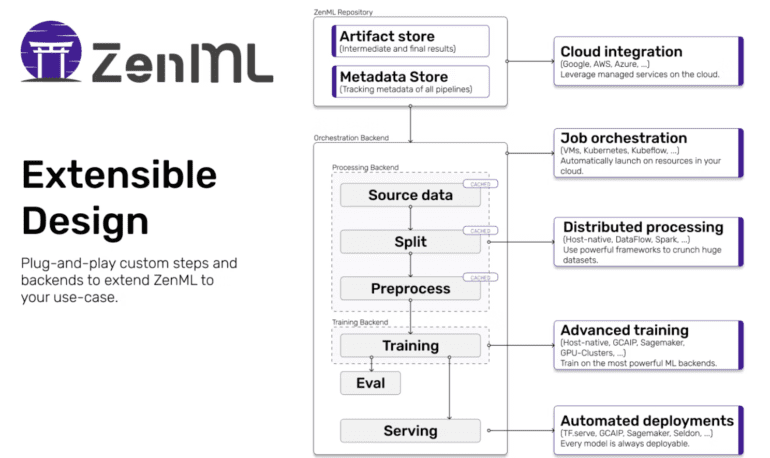TL;DR:
- ZenML, an open-source framework, aims to unify AI tools for collaboration.
- It enables companies to create custom, smaller AI models, reducing API dependence.
- The startup has secured $6.4 million in funding and boasts 3,000+ stars on GitHub.
- ZenML simplifies ML pipelines and accelerates machine learning for beginners.
- Integration with open-source ML tools and cloud services enhances its functionality.
- ZenML’s vision aligns with a growing need for specialized, cost-effective AI solutions.
- Market shift towards in-house, specialized AI models may reshape the industry.
Main AI News:
In the dynamic landscape of AI, while tech giants experiment with OpenAI’s API, a burgeoning startup holds a different vision. ZenML, the brainchild of founders Adam Probst and Hamza Tahir, aspires to be the adhesive that unites all open-source AI tools. This visionary open-source framework offers the means to construct pipelines, fostering collaboration among data scientists, machine-learning engineers, and platform engineers to birth novel AI models.
What sets ZenML apart is its focus on enabling companies to forge their own private models. While they may not be in direct competition with behemoths like GPT-4, companies can develop more tailored, smaller AI models, custom-fit for their unique requirements. This not only grants them autonomy but also reduces reliance on API providers like OpenAI and Anthropic.
Louis Coppey, a partner at VC firm Point Nine, shared his insight, saying, “The idea is that, once the first wave of hype with everyone using OpenAI or closed-source APIs is over, [ZenML] will enable people to build their own stack.“
Earlier this year, ZenML secured additional funding from Point Nine and existing investor Crane, further propelling its journey. With headquarters in Munich, Germany, this startup has amassed a formidable $6.4 million since its inception.
The genesis of ZenML traces back to Probst and Tahir’s prior collaboration on ML pipelines for specific industries. Their relentless quest to streamline the creation and deployment of machine learning models led to the development of ZenML. Simultaneously, ZenML paves the way for novice machine learning engineers to accelerate their journey by leveraging this modular system, a space affectionately termed MLOps – akin to DevOps, but tailored explicitly to the realm of ML.
“We are connecting the open-source tools that are focusing on specific steps of the value chain to build a machine learning pipeline — everything on the back of the hyperscalers, so everything on the back of AWS and Google — and also on-prem solutions,” elucidated Probst.
Central to ZenML is the concept of pipelines. Upon crafting a pipeline, users can execute it locally or deploy it using open-source tools like Airflow or Kubeflow. Additionally, ZenML seamlessly integrates with managed cloud services such as EC2, Vertex Pipelines, and SageMaker. It also collaborates harmoniously with open-source ML tools from Hugging Face, MLflow, TensorFlow, PyTorch, and more.
Hamza Tahir, ZenML’s CTO, encapsulated their mission succinctly, stating, “ZenML is sort of the thing that brings everything together into one single unified experience — it’s multi-vendor, multi-cloud.” ZenML elevates ML workflows with connectors, observability, and auditability.
Initially unveiled on GitHub as an open-source tool, ZenML has garnered over 3,000 stars on the platform. Moreover, it has ventured into the cloud arena, offering managed servers with CI/CD triggers on the horizon.
ZenML’s user base spans various sectors, including industrial applications, e-commerce recommendations, medical image recognition, and more. Notable clients include Rivian, Playtika, and Leroy Merlin.
Yet, ZenML’s future success hinges on the trajectory of the AI ecosystem. Currently, many companies incorporate AI functionalities through OpenAI’s API, but there are challenges. These APIs are intricate and costly, tailored for general use cases rather than specific ones. Probst elaborated, “OpenAI, or these large language models built behind closed doors are built for general use cases — not for specific use cases. So currently, it’s way too trained and way too expensive for specific use cases.”
ZenML perceives a different path. It champions the idea that the majority of the market will require bespoke solutions. European regulations, in particular, may encourage companies to adopt AI models trained on precise data sets and in specific ways.
Sam Altman, CEO of OpenAI, envisions a hybrid future, where both specialized and broad AI models coexist. “I think both have an important role. We’re interested in both, and the future will be a hybrid of both,” Altman opined.
As the AI landscape matures and regulations evolve, the role of specialized, cost-effective, and in-house AI models gains prominence. Tahir aptly summed it up, saying, “The value of MLOps is that we believe that 99% of AI use cases will be driven by more specialized, cheaper, smaller models that will be trained in house.”
Conclusion:
ZenML’s emergence signifies a shift towards companies seeking greater autonomy in AI model development. The startup’s ability to streamline the integration of open-source tools and empower businesses to build tailored AI models could disrupt the market, especially as demand for specialized, cost-effective AI models continues to grow, driven by evolving regulations and the limitations of existing API solutions.

